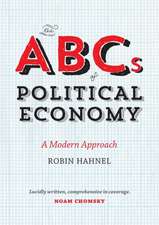Accepting Authoritarianism: State-Society Relations in China's Reform Era
Autor Teresa Wrighten Limba Engleză Hardback – 7 mar 2010
Why hasn't the emergence of capitalism led China's citizenry to press for liberal democratic change? This book argues that China's combination of state-led development, late industrialization, and socialist legacies have affected popular perceptions of socioeconomic mobility, economic dependence on the state, and political options, giving citizens incentives to perpetuate the political status quo and disincentives to embrace liberal democratic change.
Wright addresses the ways in which China's political and economic development shares broader features of state-led late industrialization and post-socialist transformation with countries as diverse as Mexico, India, Tunisia, Indonesia, South Korea, Brazil, Russia, and Vietnam.
With its detailed analysis of China's major socioeconomic groups (private entrepreneurs, state sector workers, private sector workers, professionals and students, and farmers), Accepting Authoritarianism is an up-to-date, comprehensive, and coherent text on the evolution of state-society relations in reform-era China.
Wright addresses the ways in which China's political and economic development shares broader features of state-led late industrialization and post-socialist transformation with countries as diverse as Mexico, India, Tunisia, Indonesia, South Korea, Brazil, Russia, and Vietnam.
With its detailed analysis of China's major socioeconomic groups (private entrepreneurs, state sector workers, private sector workers, professionals and students, and farmers), Accepting Authoritarianism is an up-to-date, comprehensive, and coherent text on the evolution of state-society relations in reform-era China.
| Toate formatele și edițiile | Preț | Express |
|---|---|---|
| Paperback (1) | 193.58 lei 22-36 zile | |
| Stanford University Press – 7 mar 2010 | 193.58 lei 22-36 zile | |
| Hardback (1) | 703.69 lei 43-57 zile | |
| Stanford University Press – 7 mar 2010 | 703.69 lei 43-57 zile |
Preț: 703.69 lei
Preț vechi: 868.75 lei
-19% Nou
Puncte Express: 1056
Preț estimativ în valută:
134.65€ • 140.94$ • 112.07£
134.65€ • 140.94$ • 112.07£
Carte tipărită la comandă
Livrare economică 31 martie-14 aprilie
Preluare comenzi: 021 569.72.76
Specificații
ISBN-13: 9780804769037
ISBN-10: 0804769036
Pagini: 264
Dimensiuni: 152 x 229 x 15 mm
Greutate: 0.53 kg
Ediția:1
Editura: Stanford University Press
Colecția Stanford University Press
ISBN-10: 0804769036
Pagini: 264
Dimensiuni: 152 x 229 x 15 mm
Greutate: 0.53 kg
Ediția:1
Editura: Stanford University Press
Colecția Stanford University Press
Recenzii
"The book is well paced, informative, and jargon-free, and for all these reasons it would be a good selection for university courses on contemporary China."—Jonathan Unger, China Review International
"Wright's class-based analysis . . . is extremely valuable."—Jessica C. Teets, The Review of Politics
"Wright's book is an important contribution to the literature on post-Mao China. Its examination of the different attitudes of social groups toward the Communist Party's rule is based on extensive research. The analytical framework, which uses a political economy perspective, is straightforward and intuitively persuasive . . . Wright's clear and well-reasoned book is bound to elicit a spirited debate in the China field as to whether China's key social groups have indeed accepted authoritarianism."—Minxin Pei, China Journal
"Wright makes her argument by synthesising surveys, interviews, and statistics developed by the leading scholars of contemporary China. As a knowledgeable researcher, she puts her findings in comparative perspectives with early democratisers and late developers. Her important work merits grappling with. I learned something new from her on virtually every page."—Edward Friedman, China Perspectives
"Wright draws extensively on existing research to develop a cogent explanation of the broad-based support in China for the ruling Communist Party . . . Recommended."—J. M. Peek, CHOICE
"Accepting Authoritarianism ingeniously and exhaustively plumbs the literature on five key social groups in contemporary China to build a powerful and convincing case arguing that the incentive structure facing Chinese citizens encourages them to sustain the rule of the Communist Party—at least for awhile."—Dorothy J. Solinger, University of California, Irvine
"Teresa Wright lucidly and analytically explains how China's Communist Party has carried out fundamental economic changes in China that have been accompanied by increasing inequalities as well as increasing prosperity, without sparking large-scale social discontent and demands for political reforms. This book is indispensable in understanding the momentous changes underway in China today."—Merle Goldman, Professor Emerita of History, Boston University
"Accepting Authoritarianism ingeniously and exhaustively plumbs the literature on five key social groups in contemporary China to build a powerful and convincing case arguing that the incentive structure facing Chinese citizens encourages them to sustain the rule of the Communist Party—at least for awhile."—Dorothy J. Solinger, University of California, Irvine
"Teresa Wright lucidly and analytically explains how China's Communist Party has carried out fundamental economic changes in China that have been accompanied by increasing inequalities as well as increasing prosperity, without sparking large-scale social discontent and demands for political reforms. This book is indispensable in understanding the momentous changes underway in China today."—Merle Goldman, Professor Emerita of History, Boston University
Notă biografică
Teresa Wright is Professor of Political Science at California State University, Long Beach. She is also the author of The Perils of Protest: State Repression and Student Activism in China.
Descriere
This comprehensive examination of the latest and most influential research on state-society relations in post-Mao China explains why three decades of capitalist economic growth have not led to increased public pressure for liberal democratic change.















